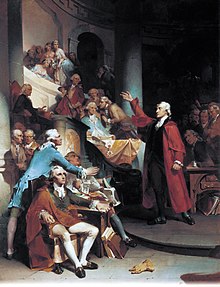
This list of speeches includes those that have gained notability in English or in English translation. The earliest listings may be approximate dates.

This list of speeches includes those that have gained notability in English or in English translation. The earliest listings may be approximate dates.
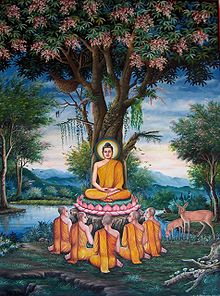
| Part of a series on |
| Rhetoric |
|---|
 |
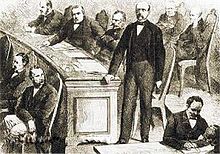
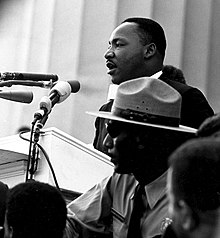

The Gettysburg Address is a speech that U.S. President Abraham Lincoln delivered during the American Civil War at the dedication of the Soldiers' National Cemetery, now known as Gettysburg National Cemetery, in Gettysburg, Pennsylvania on the afternoon of November 19, 1863, four and a half months after the Union armies defeated Confederate forces in the Battle of Gettysburg, the Civil War's deadliest battle. The speech is widely considered one of the most notable and famous delivered in American history.

The State of the Union Address is an annual message delivered by the president of the United States to a joint session of the United States Congress near the beginning of most calendar years on the current condition of the nation. The State of the Union Address generally includes reports on the nation's budget, economy, news, agenda, progress, achievements and the president's priorities and legislative proposals.
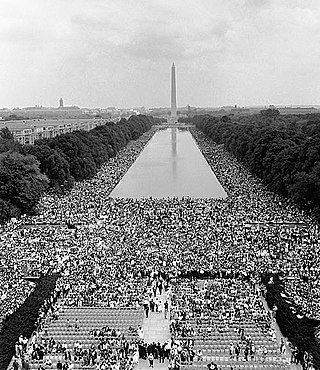
The March on Washington for Jobs and Freedom, also known as simply the March on Washington or the Great March on Washington, was held in Washington, D.C., on August 28, 1963. The purpose of the march was to advocate for the civil and economic rights of African Americans. At the march, final speaker Dr. Martin Luther King Jr., standing in front of the Lincoln Memorial, delivered his historic "I Have a Dream" speech in which he called for an end to racism and racial segregation.
"City upon a hill" is a phrase derived from the teaching of salt and light in Jesus's Sermon on the Mount. Originally applied to the city of Boston by early 17th century Puritans, it came to adopt broader use in political rhetoric in United States politics, that of a declaration of American exceptionalism, and referring to America acting as a "beacon of hope" for the world.
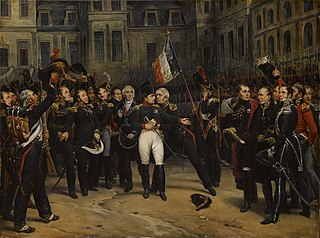
A farewell speech or farewell address is a speech given by an individual leaving a position or place. They are often used by public figures such as politicians as a capstone to the preceding career, or as statements delivered by persons relating to reasons for their leaving. The term is often used as a euphemism for "retirement speech," though it is broader in that it may include geographical or even biological conclusion.

A joint address is a special procedure of the Canadian Parliament, in which members of the House of Commons and Senate sit jointly in the former chamber, the latter acting, for the occasion, as an auditorium. The speaker of the House of Commons takes his chair, as normal, with the speaker of the Senate seated to their right. Members of Parliament also take their usual seats, with senators and justices of the Supreme Court positioned on the floor of the House, in front of the clerk's table. Gallery privileges are suspended during a joint address and access to those areas is strictly limited to invited guests.
"A More Perfect Union" is the title of a speech delivered by then-Senator Barack Obama on March 18, 2008, in the course of the contest for the 2008 Democratic Party presidential nomination. Speaking before an audience at the National Constitution Center in Philadelphia, Pennsylvania, Obama was responding to a spike in the attention paid to controversial remarks made by Jeremiah Wright, his former pastor and, until shortly before the speech, a participant in his campaign. Obama framed his response in terms of the broader issue of race in the United States. The speech's title was taken from the Preamble to the United States Constitution.

"I Have a Dream" is a public speech that was delivered by American civil rights activist and Baptist minister Martin Luther King Jr. during the March on Washington for Jobs and Freedom on August 28, 1963. In the speech, King called for civil and economic rights and an end to racism in the United States. Delivered to over 250,000 civil rights supporters from the steps of the Lincoln Memorial in Washington, D.C., the speech was one of the most famous moments of the civil rights movement and among the most iconic speeches in American history.
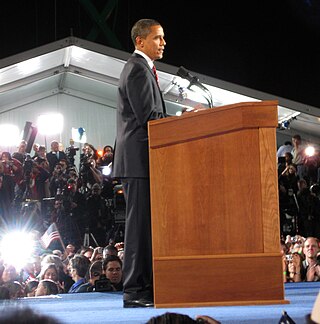
Following his victory in the 2008 United States presidential election, then-President-elect Barack Obama gave his victory speech at Grant Park in his home city of Chicago, on November 4, 2008, before an estimated crowd of 240,000. Viewed on television and the Internet by millions of people around the globe, Obama's speech focused on the major issues facing the United States and the world, all echoed through his campaign slogan of change. He also mentioned his maternal grandmother Madelyn Dunham, who had died just two nights earlier.

The first inauguration of Barack Obama as the 44th president of the United States took place on Tuesday, January 20, 2009, at the West Front of the United States Capitol in Washington, D.C. The 56th inauguration, which set a record attendance for any event held in the city, marked the commencement of the first term of Barack Obama as president and Joe Biden as vice president. Based on combined attendance numbers, television viewership, and Internet traffic, it was one of the most-observed events ever by the global audience at the time.

The inauguration of John F. Kennedy as the 35th president of the United States was held on Friday, January 20, 1961, at the East Portico of the United States Capitol in Washington, D.C. This was the 44th inauguration and marked the commencement of John F. Kennedy's and Lyndon B. Johnson's only term as president and vice president. Kennedy was assassinated 2 years, 306 days into this term, and Johnson succeeded to the presidency.

"On the Mindless Menace of Violence" is a speech given by United States Senator and presidential candidate Robert F. Kennedy. He delivered it in front of the City Club of Cleveland at the Sheraton-Cleveland Hotel on April 5, 1968, the day after the assassination of Martin Luther King Jr. With the speech, Kennedy sought to counter the King-related riots and disorder emerging in various cities, and address what he viewed as the growing problem of violence in American society.
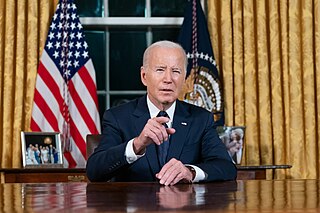
An Oval Office address is a type of speech made from a President of the United States in the Oval Office at the White House. It is considered among the most solemn settings for an address made by a leader, and is most often delivered to announce a major new policy initiative, on the occasion of a leader's departure from office, or during times of national emergency.

The second inauguration of Barack Obama as the 44th president of the United States was the 57th inauguration, marking the commencement of his second and final term, with Joe Biden as vice president. A private swearing-in ceremony took place on Sunday, January 20, 2013, in the Blue Room of the White House, followed by a public inauguration ceremony on Monday, January 21, 2013, at the West Front of the United States Capitol in Washington, D.C.

Barack Obama served as the 44th President of the United States from 2009 to 2017. Before his presidency, he served in the Illinois Senate (1997–2004) and the United States Senate (2005–2008).
The Second Emancipation Proclamation is the term applied to an envisioned executive order that Martin Luther King Jr. and other leaders of the Civil Rights Movement called on President John F. Kennedy to issue. As the Emancipation Proclamation was an executive order issued by President Abraham Lincoln to free all slaves being held in states at war with the Union, the envisioned "Second Emancipation Proclamation" was to use the powers of the executive office to strike a severe blow to segregation.
The following is a timeline of the presidency of Barack Obama, from January 1, 2016 to January 20, 2017. For his time as president-elect, see the presidential transition of Barack Obama; for a detailed account of his first months in office, see first 100 days of Barack Obama's presidency; for a complete itinerary of his travels, see list of presidential trips made by Barack Obama.
The following outline is provided as an overview of and topical guide to Abraham Lincoln:

Let Us Continue is a speech that 36th President of the United States Lyndon B. Johnson delivered to a joint session of Congress on November 27, 1963, five days after the assassination of his predecessor John F. Kennedy. The almost 25-minute speech is considered one of the most important in his political career.